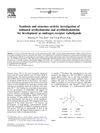 54 citations,
August 2005 in “Alcohol”
54 citations,
August 2005 in “Alcohol” Finasteride affects alcohol intake in male mice, possibly due to neurosteroids.
 31 citations,
March 2015 in “The Journal of Steroid Biochemistry and Molecular Biology”
31 citations,
March 2015 in “The Journal of Steroid Biochemistry and Molecular Biology” Neuroactive steroids could become safe, effective treatments with more understanding of their complex brain actions and metabolism.
 33 citations,
December 2015 in “Neuroendocrinology”
33 citations,
December 2015 in “Neuroendocrinology” Finasteride treatment changes brain steroid levels and receptors, affecting brain function even after stopping treatment.
[object Object]  28 citations,
December 2003 in “Medical Hypotheses”
28 citations,
December 2003 in “Medical Hypotheses” Ketoconazole shampoo with finasteride improves hair density in men with hair loss.
 1 citations,
February 2014 in “Archiv Der Pharmazie”
1 citations,
February 2014 in “Archiv Der Pharmazie” Carbamates may help treat androgen-dependent conditions by changing how certain lipid enzymes are produced.
 8 citations,
July 2019 in “Endocrine connections”
8 citations,
July 2019 in “Endocrine connections” Finasteride affects SRD5A2 gene pattern, possibly causing lasting side effects.
 36 citations,
April 2016 in “British journal of dermatology/British journal of dermatology, Supplement”
36 citations,
April 2016 in “British journal of dermatology/British journal of dermatology, Supplement” A substance called VIP might protect hair follicles from being attacked by the immune system, and problems with VIP signaling could lead to hair loss in alopecia areata.
2 citations,
May 2019 in “운동과학” Resistance exercise can reduce muscle protein issues caused by finasteride.
[object Object]  38 citations,
December 2009 in “Therapeutic Advances in Medical Oncology”
38 citations,
December 2009 in “Therapeutic Advances in Medical Oncology” The conclusion suggests that prostate cancer should be classified by castration status and that new therapies targeting androgen receptor signaling show promise.
 6 citations,
November 2004 in “Bioorganic & Medicinal Chemistry Letters”
6 citations,
November 2004 in “Bioorganic & Medicinal Chemistry Letters” Scientists created iodinated arylhydantoins and arylthiohydantoins that could potentially be used for imaging prostate cancer. Some versions with specific side-chains showed high potential for this use.
 28 citations,
August 2003 in “Steroids”
28 citations,
August 2003 in “Steroids” Hirsute women have lower type 2 17β-HSD enzyme levels, which improve with treatment.
 58 citations,
January 2003 in “Thrombosis and Haemostasis”
58 citations,
January 2003 in “Thrombosis and Haemostasis” Testosterone may slow down wound healing and increase inflammation.











